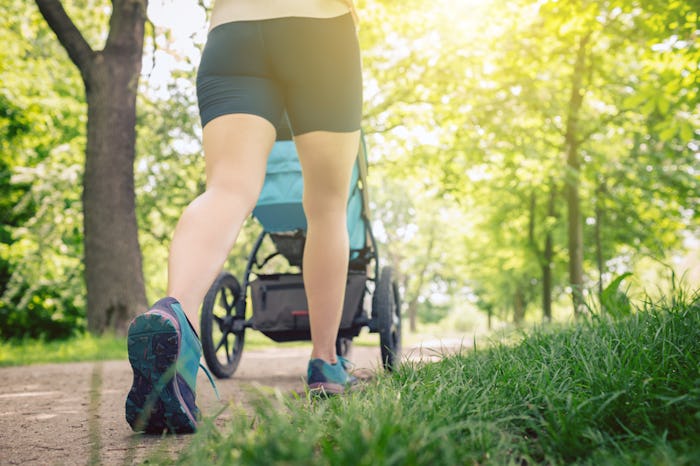Life
7 Things That Happen To Your Metabolism After You Have A Baby
Pregnancy changes the body in some pretty obvious ways (hello, baby bump), but it can also affect the inner workings of the body as well. For instance, the many things that happen to your metabolism after you have a baby are pretty fascinating. As the old saying goes, babies change everything, and the metabolism is no exception.
First, though, it's helpful to get a grasp on what the metabolism actually does. Broadly, the word metabolism refers to the process by which the body turns food into energy, according to the Mayo Clinic. The food you eat, as well as your exercise habits, can affect the speed at which your metabolism works. But plenty of other things, from medications to (of course) pregnancy can also affect the way it functions. Although people tend to define the metabolism in terms of fast or slow, there's a lot more going on. It's a complicated bodily process affected by all sorts of different factors, including your age and activity level, as further noted in the Mayo Clinic.
So to learn more about pregnancy's affect on the metabolism, Romper reached out to two experts. Breanna Herring, MSN, is a Certified Nurse Midwife at Unity Point Health, and Dr. Amy Markese is a board-certified OB/GYN and an instructor at the University of Colorado Department of Obstetrics and Gynecology. Both provided excellent insight into the way pregnancy can affect a person's metabolism.
1Remains Elevated (For A Bit)
For most people, pregnancy itself provides a huge metabolic boost. "Your metabolism may increase by as much as 15-20 percent over the course of a pregnancy as your baby grows larger," says Herring. This increase may continue after the delivery, depending on the individual's age, activity levels, and genetic disposition. (Really, there are a lot of factors that affect the metabolism.)
2Responds To Breastfeeding
Nursing your baby may keep that ramped-up metabolic rate going for a bit longer, too. "An increase in metabolic demand persists throughout the pregnancy and after delivery, especially in breastfeeding moms," says Markese. Hey, nursing takes a lot of energy, as any breastfeeding person can attest.
3Slows Down After Weaning
Your baby's switch to solid food isn't the only milestone. In fact, the body tends to return to its pre-pregnancy metabolism after weaning, according to Women's Health. This is assuming you haven't lost much muscle since delivery.
4Gets Affected By Eating Habits
When you're caught up in the whirlwind of newborn care, it's easy to forget to feed yourself now and then. But if you regularly take in too few calories each day, your metabolism can slow down, according to What To Expect. It can be difficult, but taking care of yourself during this time is also so crucial.
5Responds To Lifestyle
The choices you make in the post-pregnancy days can affect your metabolism as well. "The best way to handle the natural changes in the body that occur during pregnancy is to maintain a healthy lifestyle. A balanced diet with plenty of lean proteins and vegetables supports good health," says Markese. Getting about 30 minutes of exercise daily is also beneficial, as Markese notes.
6Plateaus
When a person loses weight after delivery, this causes the metabolism to slow down, and the weight loss may level off or plateau. "This plateau is a normal response," said OB-GYN Sherry Ross in Cosmopolitan. It's just the way the body operates.
7Varies A Lot From One Individual To Another
It's almost impossible to overstate just how much the metabolism varies from person to person. In a way, it's an incredibly personal thing. As always, if you have any concerns about your metabolism or health in general, don't hesitate to contact a healthcare professional for advice.
